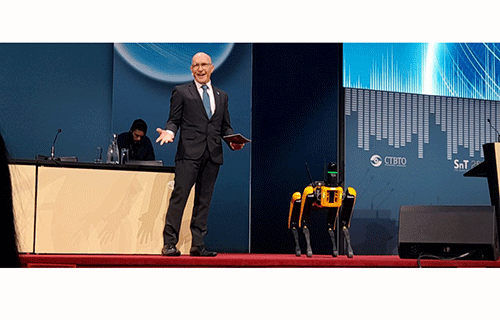The CTBT: Science and Technology Conference (SnT2023) wrapped up at the enc of June 2023 after bringing together over 2 000 scientists, technologists, academics and journalists, as well as Member States and civil society representatives from around the world. The week-long biennial event, held at Vienna’s historic Hofburg Palace, offered both in-person and online participation.
The conference focused on recent advancements and methods in nuclear test-ban monitoring, on-site inspection, and the diverse civil and scientific applications of the data collected by the organisation’s global monitoring system – established by the Comprehensive Nuclear-Test-Ban Treaty (CTBT).
SnT2023, the seventh edition of the conference, kicked off with a high-level opening, featuring welcoming remarks from the Comprehensive Nuclear-Test-Ban Treaty Organisation (CTBTO)’s Executive Secretary Robert Floyd.
“147 countries [are represented here]. Just think about all those languages and cultures. Yet, we have one common language – the language of our internationally-agreed scientific standards. This is the ‘Power of Together’. This is what the CTBTO represents,” said the biologist and research scientist.
His words resonated with the audience in Hofburg’s Festsaal, an imperial hall adorned with ceiling paintings by Alois Hans Schramm, reflecting the motto of “Viribus Unitis” (with united strength).
His address to the near-capacity hall, where some 1 000 people were in attendance, was followed by statements of support from a line-up of high-level figures, including Rafael Grossi, Director General of the International Atomic Energy Agency (IAEA), Jill Hruby, Under- Secretary for Nuclear Security of the United States Department of Energy and Administrator of the National Nuclear Security Administration (NNSA), and Alinne Olvera Martínez, a youth representative and alumna of the CTBTO Mentoring Programme.
Izumi Nakamitsu, the United Nations Under-Secretary-General and High Representative for Disarmament Affairs, delivered a video message, commending SnT2023 for “serving as a valuable opportunity for representatives to engage one another.”
Officials from Somalia and South Sudan expressed their commitment to the Treaty during their remarks, delivering highly- anticipated news. Abshir Omar Jama Huruse, Minister of Foreign Affairs and International Cooperation of Somalia, said “signing and ratifying the CTBT is not merely a symbolic gesture, but a testament to our unwavering dedication to global peace and security.”
Mayen Dut Wol, Under-secretary of the Ministry of Foreign Affairs and International Cooperation of South Sudan, also pledged his country’s support to advance nuclear non-proliferation and disarmament, “[We are] keen to sign and ratify the Treaty as a commitment to international peace and security in the nearest time.”
Since March 2022, the CTBT has received seven ratifications, including from The Gambia and Tuvalu. Dominica’s ratification universalised the Treaty in Latin America and the Caribbean. Timor-Leste’s ratification resulted in full adherence in South-East Asia, while the ratifications of Equatorial Guinea and São Tomé and Príncipe accomplished the same in Central Africa. Additionally, the ratification by the Solomon Islands marked a significant stride towards full adherence in the Pacific region.
Most recently, both Sri Lanka and Papua New Guinea successfully completed their domestic ratification processes.
SnT2023’s opening session was followed
by a high-level discussion on the theme, “CTBT Science and Technology: Benefitting us all.” The panel consisted of five
distinguished experts who delved into the various ways the International Monitoring System (IMS) benefits humanity, encompassing both its civil and scientific applications.
The conference’s high-level opening stood out as the first SnT conference to offer interpretation in all official UN languages, and special sessions were conducted in Arabic, French and Spanish, highlighting
the CTBTO’s commitment to
multilingualism.



